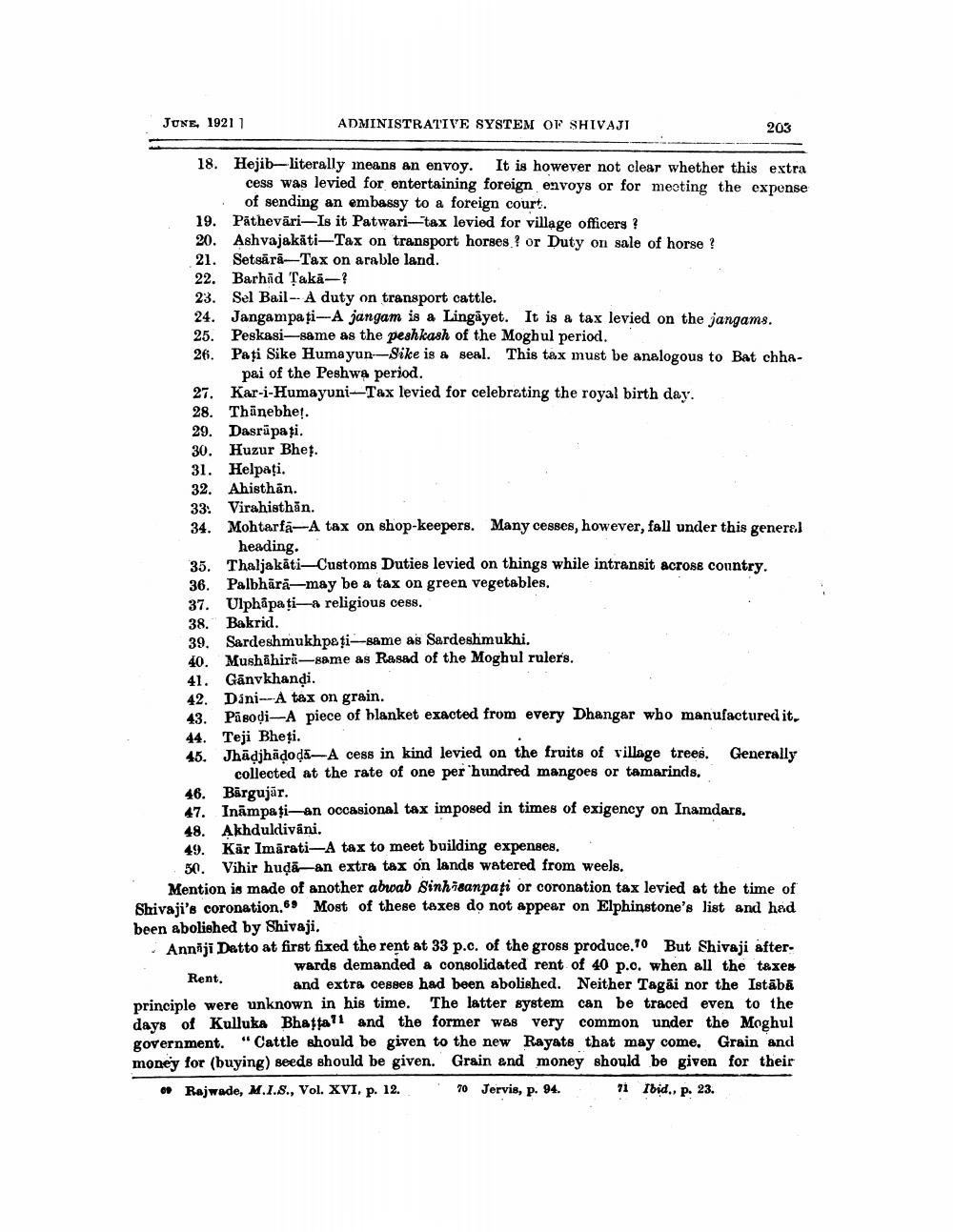________________
JUNE 1921 1
ADMINISTRATIVE SYSTEM OF SHIVAJI
203
18. Hejib-literally means an envoy. It is however not clear whether this extra
cess was levied for entertaining foreign envoys or for meeting the expense
of sending an embassy to a foreign court. 19. Pätheväri-Is it Patwari-tax levied for village officers ? 20. Ashvajakäti-Tax on transport horses ? or Duty on sale of horse ? 21. Setsārā—Tax on arable land. 22. Barhad Taka-? 23. Sel Bail - A duty on transport cattle. 24. Jangampați- A jangam is a Lingayet. It is a tax levied on the jangams. 25. Peskasi—same as the peshkash of the Moghul period. 26. Pati Sike Humayun-Sike is & seal. This tax must be analogous to Bat chha
pai of the Peshwa period. 27. Kar-i-Humayuni-Tax levied for celebrating the royal birth day. 28. Thānebhet. 29. Dasrūpati. 30. Huzur Bhet. 31. Helpaţi. 32. Ahisthan. 33. Virahisthān. 34. Mohtarfa-A tax on shop-keepers. Many cesses, however, fall under this general
heading. 35. Thaljakāti-Customs Duties levied on things while intransit across country. 36. Palbhāra-may be a tax on green vegetables, 37. Ulphấpaţi-a religious cess. 38." Bakrid. 39. Sardeshmukhpe ţi--same as Sardeshmukhi. 40. Mushāhiri-same as Rasad of the Moghul rulers.
Ganvkhandi.
Dini- tex on grain. 43. PūBodi-A piece of blanket exacted from every Dhangar who manufactured it,
Teji Bheti. Jhädjhidoda-A cess in kind levied on the fruits of village trees. Generally
collected at the rate of one per hundred mangoes or tamarinds. Bārgujār.
Ināmpati -an occasional tax imposed in times of exigency on Inamdars. 48. Akhduldivani. 49. Kür Imarati-A tax to meet building expenses.
30. Vihir huda-an extra tax on lands watered from weels.
Mention is made of another abwab Sinhisanpaţi or coronation tax levied at the time of Shivaji's coronation.69 Most of these taxes do not appear on Elphinstone's list and had been abolished by Shivaji. Anniji Detto at first fixed the rent at 33 p.c. of the gross produce.TO But Shivaji after.
wards demanded a consolidated rent of 40 p.o. when all the taxes Rent.
and extra cesses had been abolished. Neither Tagāi nor the Istaba principle were unknown in his time. The latter system can be traced even to the days of Kulluka Bhattall and the former was very common under the Moghul government. "Cattle should be given to the new Rayats that may come, Grain and money for (buying) seeds should be given. Grain and money should be given for their
Rajwade, M.I.s., Vol. XVI. p. 12. ' 70 Jervis, p. 94. Ibid., p. 23.




